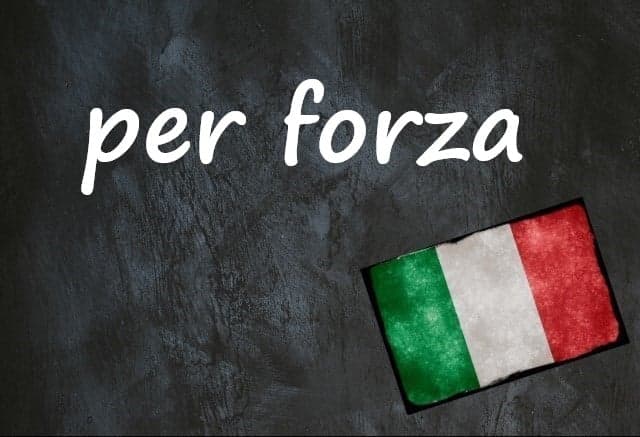
Italian expression of the day: 'Per forza'

You won't find this one too difficult, of course.
You may be familiar with the encouraging Italian word forza, used to reassure people that they can make it through difficult times.
But what about per forza?
You'll hear this phrase at the end of all kinds of statements, and the meaning is far from obvious. But it's not the same as forza on its own.
Literally, it means "by force".
- l'ha fatto per forza
- he was forced to do it
The verb forzare, as you might expect, means "to force", and is mostly used to talk about having to do things unwillingly.
- hanno forzato la mia volontà
- they forced me into it
But often that's not what it means at all.
Figuratively speaking, the same phrase can be used as an adverb to mean “of course” or “necessarily”:
- Se lo chiedi così, per forza dirà di sì.
- If you ask like that, of course he'll say yes.
You might hear it tacked on to the end of statements, much as we might add "obviously" in English.
- Non dovete dire qualcosa per forza.
- You don't have to say anything, obviously.
And listen out for it being used as part of this saying:
- o per volere o per forza
- literally "by will or by force", by any means necessary - similar to the English "by hook or by crook".
Do you have an Italian word or phrase you'd like us to feature? If so, please email us with your suggestion.
Comments
See Also
You may be familiar with the encouraging Italian word forza, used to reassure people that they can make it through difficult times.
But what about per forza?
You'll hear this phrase at the end of all kinds of statements, and the meaning is far from obvious. But it's not the same as forza on its own.
Literally, it means "by force".
- l'ha fatto per forza
- he was forced to do it
The verb forzare, as you might expect, means "to force", and is mostly used to talk about having to do things unwillingly.
- hanno forzato la mia volontà
- they forced me into it
But often that's not what it means at all.
Figuratively speaking, the same phrase can be used as an adverb to mean “of course” or “necessarily”:
- Se lo chiedi così, per forza dirà di sì.
- If you ask like that, of course he'll say yes.
You might hear it tacked on to the end of statements, much as we might add "obviously" in English.
- Non dovete dire qualcosa per forza.
- You don't have to say anything, obviously.
Join the conversation in our comments section below. Share your own views and experience and if you have a question or suggestion for our journalists then email us at [email protected].
Please keep comments civil, constructive and on topic – and make sure to read our terms of use before getting involved.
Please log in here to leave a comment.